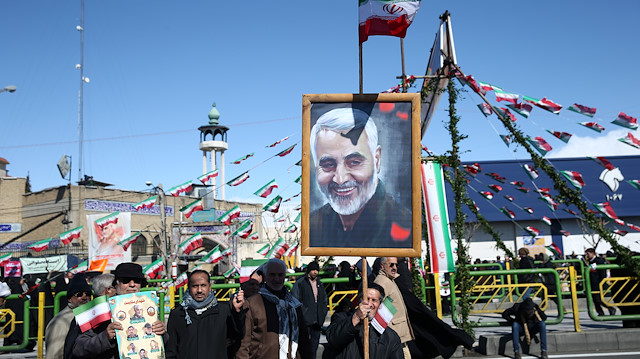
With January killing of top Iranian Gen. Soleimani in US strike, retaliatory moves, mutual threats started between Iran, US
The decades of tension between Iran and the U.S. reached a peak in early 2020, after the U.S. killing of top Iranian general Qasem Soleimani in Iraq last month.
On Sunday, Iranian President Hassan Rouhani said the U.S. will not pursue war with his country, "since they know what harm it could do them."
Several weeks ago, he threatened that the U.S. and European forces are not safe in the Middle East.
Anadolu Agency talked to experts for their evaluation of the tension between Iran and the U.S. after Soleimani's killing in a U.S. drone strike.
On Rouhani’s warning for the U.S. soldiers in the Middle East, Hakki Uygur, deputy head of the Center for Iranian Studies in Ankara (IRAM), said the Iranian leader draws attention to the possibility of a military conflict and warns against European and the U.S. casualties if that conflict happens.
Rouhani also aims to pressure Europe to increase the frequency of diplomatic efforts, Uygur told Anadolu Agency.
He argued that fundamental changes are not expected, but the cycle of events has accelerated, so new developments may occur at any time and Iran may have to make a serious decision.
Last month, Iranian Foreign Minister Javad Zarif said Iran would withdraw from the Treaty on the Non-Proliferation of Nuclear Weapons (NPT) if European countries raised the violation of the nuclear deal in the United Nations Security Council (UNSC).
"I do not think that Iran will exit the NPT. This gives an advantage of higher morale to the opponents of Iran in the U.S., and also brings Europe to the same level with the U.S. The global coalition against Iran will grow extremely," said Uygur.
He also expects further escalation between the two countries. "When the sensitive UN Security Council (UNSC) sanctions come back, diplomacy will have no function."
Hasan Koni, a law professor at Istanbul Kultur University, said Iran will continue to wage proxy wars in Yemen, Iraq and Syria.
"The U.S. pressure on Iranian economy will continue until the end of re-election campaign of Donald Trump. I think he is trying to satisfy the powerful Israeli lobby economically," he observed.
Koni stated that Trump’s policy towards Iranian people and his support for Iranian protesters enhance the position of the Iranian government.
Turning to the economic situation in Iran, Koni said the current condition is not totally the government's fault.
"Surely, the moderate Iranians are happy with the ongoing economic situation. But one remembers that economic situation is created by a foreign power. This not totally the fault of Iranian government."
On Zarif’s threat about the nuclear accord, Koni said Iran will continue adhering to the NPT.
"In the foreign eyes, this sort of legitimacy of Iran is against the U.S.' rejection of international law," he added.
The controversial “Deal of the Century” -- Trump's so-called Middle East "peace plan" -- is a proposal for the re-election of the U.S. president, according to Koni.
"Trump discovered a new plan for his re-election which is named Deal of the Century. The Palestinian issue will cover the headlines for a while and we can come back to the Iranian issue as usual," he said.
Rouhani said Trump is aware that a war with Iran will "ruin" his chances of winning the 2020 presidential elections.
Koni argued that Turkey has bigger problems than the escalated tension between Iran and the U.S.
"The Iran issue will not affect Turkey. It has other big problems in Idlib [northwestern Syria], another one in Libya and ongoing terrorism in Iraq, Syria and within Turkey."
- Timeline of soaring Iran-US ties since Soleimani's killing
With the killing of Soleimani on Jan. 3, mutual threats started between Iran and the U.S.
The U.S. announced that it was deploying 3,000 additional troops to the Middle East.
Meanwhile, Iran announced on Jan. 5 that it would no longer comply with any commitments under the 2015 nuclear deal signed with several world powers.
The day after, Trump said that Iran will not develop a nuclear weapon.
On Jan. 8, Iran's Islamic Revolutionary Guard Corps fired "tens of missiles" at Iraq's Ain al-Assad air base jointly operated by the U.S. and Iraqi forces.
Trump said the U.S. targeted 52 Iranian sites to hit if any Iranian retaliation strikes American targets or interests.
In the midst of the hot tension between the two countries, Iran on Jan. 8 dropped a plane of Ukrainian airlines with a missile, killing all 176 passengers aboard.
Iran rejected the incident at the beginning, however some countries, especially Canada, announced that they had evidence.
With the increasing international pressure, Iran admitted that the plane was accidentally hit by a missile and Iranian Foreign Minister Javad Zarif had to apologize for the incident.
The U.S. representative of the UNSC Kelly Craft gave a letter to the council that they are ready for unconditional negotiations with Iran.
However, Iran had said it does not want a war with the U.S.
All events were followed with caution and anxiety, especially by the countries of the region.
The tension that increased after the death of Soleimani has not yet ended.


